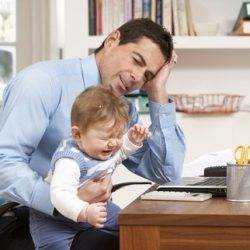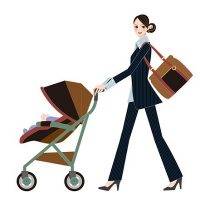January 19, 2018
Working families at breaking point as parents buckle under the strain of overwork, claims study
 The UK’s working parents are struggling to cope with the strain of overwork – and deliberately stalling and downshifting their careers to reverse the negative impact it is having on family life, according to a new study. The 2018 Modern Families Index, published today by work life charity Working Families and Bright Horizons, reveals the stress of the modern workplace is pushing parents to breaking point, creating a ‘parenthood penalty’. According to the study, many parents are obliged to work far over their contracted hours due to increasingly intense workloads or because they feel it is expected of them.
The UK’s working parents are struggling to cope with the strain of overwork – and deliberately stalling and downshifting their careers to reverse the negative impact it is having on family life, according to a new study. The 2018 Modern Families Index, published today by work life charity Working Families and Bright Horizons, reveals the stress of the modern workplace is pushing parents to breaking point, creating a ‘parenthood penalty’. According to the study, many parents are obliged to work far over their contracted hours due to increasingly intense workloads or because they feel it is expected of them.







 The majority (83 percent) of workers view flexible working as an important benefit to them but two thirds (66 percent) believe that taking up flexible working halts progression at work. One of the reasons for this dichotomy suggests the results of the Hays UK Gender Diversity Report 2017, is because nearly a third (32 percent) of employees believe men will be viewed as less committed to their career if they take up shared parental leave, and women are less likely to be promoted after having children. While a majority (84 percent) of workers say it’s important that flexible working options are available to them in their workplace, many choose not to take any, and two-thirds think doing so will have a negative impact on their career. Women perceive it will have a negative impact, with over three-quarters (76 percent) reporting this concern and 65 percent of men. Interestingly, both men and women think flexible working options have helped improve the gender balance in senior roles, with 61 percent saying flexible working has improved the representation of women in senior positions, indicating that employers need to address and overturn the negative perception of flexible working and communicate its benefits.
The majority (83 percent) of workers view flexible working as an important benefit to them but two thirds (66 percent) believe that taking up flexible working halts progression at work. One of the reasons for this dichotomy suggests the results of the Hays UK Gender Diversity Report 2017, is because nearly a third (32 percent) of employees believe men will be viewed as less committed to their career if they take up shared parental leave, and women are less likely to be promoted after having children. While a majority (84 percent) of workers say it’s important that flexible working options are available to them in their workplace, many choose not to take any, and two-thirds think doing so will have a negative impact on their career. Women perceive it will have a negative impact, with over three-quarters (76 percent) reporting this concern and 65 percent of men. Interestingly, both men and women think flexible working options have helped improve the gender balance in senior roles, with 61 percent saying flexible working has improved the representation of women in senior positions, indicating that employers need to address and overturn the negative perception of flexible working and communicate its benefits.



 Britain’s most family friendly and flexible employers have been recognised in this year’s Top Employers for Working Families Awards. Now in their 8th year, the annual Top Employers for Working Families Special Awards from the UK’s work life balance charity cover 11 categories across a range of work life policies and practices. Four new sector-specific awards are being introduced this year for the private, public and third sectors; as well as a category for small employers. Sarah Jackson OBE, chief executive of Working Families, said: “In many ways, flexible working and family friendly working have never been more part of the bloodstream of British business. We had a record-breaking number of entries this year, showcasing a wealth of exciting approaches to creating agility in the workplace. Congratulations to all this year’s Top Employers for Working Families award winners, singled out because they offer leading flexible workplaces that support the grain of their employees’ lives. I look forward to working with them to make work work, for people, families and the economy, so that families thrive and business prospers.”
Britain’s most family friendly and flexible employers have been recognised in this year’s Top Employers for Working Families Awards. Now in their 8th year, the annual Top Employers for Working Families Special Awards from the UK’s work life balance charity cover 11 categories across a range of work life policies and practices. Four new sector-specific awards are being introduced this year for the private, public and third sectors; as well as a category for small employers. Sarah Jackson OBE, chief executive of Working Families, said: “In many ways, flexible working and family friendly working have never been more part of the bloodstream of British business. We had a record-breaking number of entries this year, showcasing a wealth of exciting approaches to creating agility in the workplace. Congratulations to all this year’s Top Employers for Working Families award winners, singled out because they offer leading flexible workplaces that support the grain of their employees’ lives. I look forward to working with them to make work work, for people, families and the economy, so that families thrive and business prospers.”
 It is two years since the introduction of Shared Parental Leave (SPL), where couples were given the ability to share leave surrounding the arrival of a new addition to their family; and while sharing leave is seen to have a profound beneficial impact for the family, there are still plenty of barriers. According to
It is two years since the introduction of Shared Parental Leave (SPL), where couples were given the ability to share leave surrounding the arrival of a new addition to their family; and while sharing leave is seen to have a profound beneficial impact for the family, there are still plenty of barriers. According to 














April 12, 2017
Research shows how the gender pay gap can be directly related to motherhood 0
by Sara Bean • Comment, Flexible working, News, Workplace